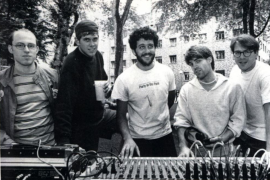Pete Krebs chose probably the worst time to release his first new album in 18 years. Not that he had any way of knowing 2020 would be so dismal—nobody did, really, barring the clairvoyants among us.
“When all this is said and done, I’ll do a record release show,” Krebs tells me over the phone. “I’m going to wait until I can do it so that it’s in a way that works with my sensibilities. But I’m not super stressed about it. I’m just glad to have a record out.”
Krebs’ bona fides are vast and varied. Outside Portland, the songwriter is perhaps best known for his work with the seminal, early ‘90s alternative rock band Hazel—a fixture of the city’s halcyon post-grunge glory days. And as a solo artist, Krebs released the now-legendary “Shytown / No Confidence Man” split 7” with Elliott Smith in 1994.
After 2002’s “Know It By Heart”, Krebs took a break from recording and releasing new material, although his label Cavity Search released the essential compilation “Hey Pete Krebs!” back in 2016. In recent decades, he’s become something of a local emblem for a very particular breed of tireless working musician—just the sort who is struggling to stay afloat in our post-coronavirus reality.
To a certain extent, that workmanlike approach is reflected in Krebs’ new LP, “All My Friends Are Ghosts,” which the songwriter recorded with his backing band The Gossamer Wings. It’s an album of stellar country rock that evokes artists like Gram Parsons and Jackson Browne. The music on “All My Friends Are Ghosts” is imbued with the seasoned perspective of someone who has clearly dedicated their entire life to the craft.
“For the past 30 years, I’ve played approximately 200 to 250 shows a year,” Krebs says. “[Before Coronavirus hit and everything shut down], I was averaging about three to five shows a week. Pretty much everything was cancelled within a week—restaurant gigs, bar gigs, even the weddings that I was scheduled to play. Everything just came to a stop. It’s been the longest break [without playing live] in my adult life.”
Though the pandemic has been nothing short of disastrous for musicians and the performing arts in general, artists like Krebs—who aren’t necessarily raking it in from evergreen royalties or lucrative Toyota ad placements and who rely primarily on local, live performances for their incomes—have been hit extra hard.
Krebs recently played his first live show in nearly six months—but out of an abundance of caution, he says he’s being “really selective” and will only consider playing outdoor gigs for the time being despite receiving a variety of offers. In the interim, Krebs—like virtually all other professional gigging musicians who saw their livelihoods evaporate overnight at the beginning of the pandemic—has had to get creative.

illustrations by Alison White
Earlier this month, Pitchfork ran a piece on professional musicians who have started teaching music lessons over Zoom in an effort to weather the pandemic. This applies to Krebs as well, who was already a music instructor before the pandemic.
“In addition to gigging off and on throughout the years, I’ve taught guitar lessons,” he says. “And so I always felt pretty comfortable [being able to make that switch.] But my cost of living is pretty low too, so, you know.”
Beyond teaching, musicians have been left with few options. Since March, live-streaming has become a popular alternative to live shows—but it’s not a perfect substitute, obviously, or a model that artists can easily or reliably monetize.
“A lot of musicians will [include a virtual tip jar in their streams], and, especially early on, people were really responsive and trying to take care of the musicians,” Krebs says. “I think as more and more musicians need to go that route to, you know, supplant the living they were making before all this happened, [we’ve realized] that every little bit helps.”
A substantial amount has been written about the plight facing live music venues, both locally and nationally. In the Spring, I authored a piece for OPB on the Independent Venue Coalition of Oregon—an organization comprising several local venue owners that has been lobbying for relief for the state’s floundering live music industry.
But it doesn’t seem like there’s been the same amount of attention spent on the plight facing the musicians themselves, which is somewhat surprising. This could be because the job title “professional musician” is uniquely impossible to essentialize; institutionally speaking, there’s little parity between a violinist for the Oregon Symphony and someone who plays original rock songs on the club circuit, even if they both play music for a living. According to Krebs, it’s more difficult for the latter type to lobby for official representation or collect union benefits
“It reminds me of the time in the ‘90s when we were trying to unionize musicians,” Krebs tells me. “And the issue that made that difficult was, how do you define what a working musician is? [A lot of us] don’t have protections. There are no certifications, and there’s nothing to separate people who have been doing it for a long time from people who have, you know, been doing it for five years or something like that. It’s just too loose of a situation.”
Despite the less-than-ideal circumstances surrounding the release of his new album, Krebs insists he’s not wallowing in sorrow. His outlook is realistic, but also constructive: “I think sometimes we—or at least I—can come across as only focusing on the negative,” Krebs admits. “But I want to focus on the positive, too, which is that I probably wouldn’t have been able to become a working musician in the first place if it weren’t for Portland and the people here and their openness to different kinds of music.”
“I don’t want to come across as someone bitching about everything because when all is said and done, I’ve been able to do exactly what I wanted with my life. But, you know, I look forward to things getting a little bit better—and for my friends and I to be able to go back to work.”






